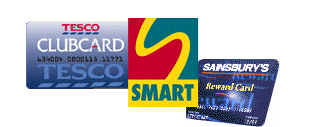Loyalty Cards

Loyalty Cards |
 |
Everybody has them these days. Go on, admit it, you've got at least two, haven't you?
It's the latest craze in shopping these days and the punters just can't get enough of the things. People are queueing up to get them. I don't think they realise what these cards are really being used for.
If you don't already know what they are, you must have recently arrived from another planet - in that case, welcome to Earth!
A loyalty card is given by a retailer to the customer. The card is presented to the retailer whenever the customer is making a purchase. The value of the purchase, usually, determines how many 'points' the customer receives. When a certain number of 'points' have been accumulated the customer receives some sort of reward, usually in the form of shopping vouchers.
Nothing wrong with that. Except that nobody has ever mentioned that this is not the main reason for the retailers issuing these cards. Oh, that's what they'd like you to think - it's just an incentive to keep you from shopping elsewhere.
Whenever you present your loyalty card at a retailer, any retailer, they record exactly what you've bought. In every detail. The loyalty card is a marketing manager's dream come true. Convince all your customers to use one, by offering a trivial incentive, and you can collect vast amounts of data about them.
For example, Citizen A buys his weekly shopping at his local supermarket. Whenever he presents his loyalty card, the till, which is now a computer itself, sends all the transaction details to the main supermarket computer where it is added to Citizen A's record. The computer is keeping a list of everything Citizen A has bought, how much he's bought, which products, and even what day and what time he's been in the supermarket.
Couple the date and time information with the security video cameras in every aisle of the supermarket and they can trace your movement thoughout the store, to see where you were at any given moment, what shelves or displays you looked at, which ones you ignored, how you make buying decisions.
The information is then compiled and customers are allocated into bands. These bands are most likely based on how much the customer spends, and where he lives. Information about the families of customers can also be kept - are you buying baby food or nappies? If you are, then the chances are you've got a young child - or some stange habits. This would then fit you into an age category, especially if you're female - though they probably know your age already, you'd have filled in your date of birth on the application form for the card.
This information can be sold to third parties who will use the information to build demographic representations of your family. This is not necessarily being done on an individual basis - but rather on the 'bands'. There's nothing to stop them doing it on an individual basis.
The loyalty card scam doesn't end there either. The supermarkets have more plans for us. They want to introduce new smart-cards, with an embedded chip. This chip is 'scanned' as you enter the supermarket, in a similar way that the security tags used on many items will trigger an alarm if they're taken through the doors.
Ultimately the supermarkets want to tailor special offers to individual customers. The idea is that when you enter the store you get personalised special offers - most likely on products you don't buy very often, or even at all. The ultimate aim is to influence what you purchase - introduce you to a new product by offering it to you cheaply, then raising the price gradually if you continue to buy it. This is a very similar method to that used by drug dealers to get you hooked - interesting, isn't it?
Update - May 2000
Safeway, the UK supermarket chain, has announced that it will be scrapping it's loyalty card scheme from the end of May 2000. It has stated that the cards do not encourage customer loyalty and customers resent having to carry them around.
Safeway was one the first UK supermarkets to introduce a loyalty card scheme. Today they have over 8 million card holders. Have they collected so much data about shoppers that they have found a constant trend in the statistics? Is this the real reason they're scrapping their cards?
Tesco and Sainsburys say that they have no plans to scrap their loyalty card schemes. Asda, now owned by the US Walmart group, trialled a loyalty card scheme last year but never moved beyond the scope of the 350,000 card trial.
Update - November 2001
Do you live in the UK? Want to see what happens to the data collected from loyalty card users? Visit http://www.upmystreet.co.uk, enter your postcode and look for the ACORN profile... then click on the provided link to the full profile details.
The level of detail, although averaged over an area is truly frightening. Nobody can deny that loyalty cards really are spies in our pockets. This is where your information is going, and this is the part they're prepared to give away for free. How specific to you is the information that is sold to other companies?
Back to main index |
Vendemen - 04 November 2001 |